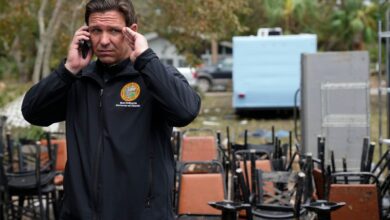He grew up with an absent dad and a love of The Prince and the Pauper. Now he’s written Prince Harry’s memoir

The two boys grew up 20 years and almost 3,500 miles apart, both navigating parental dysfunction, both floundering to find their places in vastly different worlds. One was a prince, one was far closer to the pauper end of the spectrum. They would both be fathers themselves by the time their professional paths crossed.
When it happened, however improbably, the teaming of ghostwriter JR Moehringer with the Duke of Sussex would lead to one of the most explosive memoirs in living memory. Prince Harry bares his soul, controversially, in the tell-all Spare, but it was Mr Moehringer who put the royal’s story down on paper.
The New York native was perfectly placed to do it; not only does he have a Pulitzer prize for feature writing, but he’d also published a deeply personal autobiography, The Tender Bar, about his own family 18 years beforehand. Mr Moehringer was rumoured to have been introduced to Prince Harry by George Clooney, who helped turn the ghostwriter’s memoir into a movie by the same name starring Ben Affleck in 2021.
Prince Harry may have grown up in a palace while Mr Moehringer grew up in a “flophouse,” as he calls his crowded grandparents’ home in his 2005 memoir, but the family trauma, yearning for affection and mother-son bond in both men’s youths closely mirror each other.
Mr Moehringer, 58, was raised in Manhasset on Long Island, the son of a former flight attendant and her abusive New York City radio DJ husband, Jonny Michaels, real name John Joseph Moehringer. Months after giving birth to his namesake – nicknamed JR – she left him after he threatened to carve up her face with a razor, the memoirist writes, so his father “retaliated by disappearing and withholding all help”.
The author and his mother, Dorothy, alternately lived with her parents – along with her two adult siblings, five nieces and one nephew, for a total of 12 people – and in a series of apartments on a shoestring budget. Mr Moehringer labels his absent father “The Voice” in his memoir, which chronicles how a series of other male influences stepped in to help him learn how to become a man, particularly his bartender uncle and the other unlikely role models at his tavern of employment.
“My personal list of needs was long,” he writes in The Tender Bar. “An only child abandoned by my father, I needed a family, a home and men. Especially men. I needed men as mentors, heroes, role models, and as a kind of masculine counterweight to my mother, grandmother, aunt and five female cousins with whom I lived. The bar provided me with all the men I needed, and one or two men who were the last thing I needed.”
He often referred to his only male cousin in the house, McGraw, as his brother, and the two shared an obsessive love of sports in the shadow of some of the biggest franchises in the world. They loved the Mets “because we felt like born losers,” Mr Moehringer wrote in 2008.
“Though we were in just the first inning of our lives, we were already down four runs, with a weak bullpen and no bench. Sons of single mothers, living on food stamps, attending so-so schools, wearing ill-fitting clothes, we faced a future that seemed sure to include a heavy dose of failure, ignorance and want.”
McGraw pursued his love of sports professionally and became a news and sport radio host; he currently is a popular radio personality in St Louis. Mr Moehringer, who inherited a love of words from his eccentric grandfather and uncle, became a journalist, first working at as a New York Times copyboy before moving in 1990 to the now-defunct Rocky Mountain News in Colorado, where “newspapers still gave off a vague whiff of frontier,” he wrote in 2008. “They had a rawboned looseness, an Old West tolerance for misfits, eccentrics, exiles, losers—and greenhorns. That’s why I fit right in. Not that I could articulate it at the time. I couldn’t articulate much at the time.”
He honed his craft quickly, however, moving four years later to the Los Angeles Times, where his work made him a Pulitzer finalist in 1998 before he won the top prize in 2000 for his feature Crossing Over, about the descendants of slaves in Georgia.
His first major foray into writing about his own family was in 2001, after one of his Long Island cousins, Timothy Gerard Byrne, was killed on 9/11 at the World Trade Center. Manhasset, a commuter town, was heavily hit by lives lost.
He returned to Long Island to write Mr Byrne’s obituary for the LA Times, recounting a wedding speech his cousin had given that, after 9/11, struck the family as particularly prophetic and healing. The Byrnes and the rest of Moehringer’s relatives made another literary appearance in 2005 when he published The Tender Bar – and it wasn’t long before a man so taken by Moehringer’s tale about a fatherless child called him up and asked him to write his own story.
That man was Andre Agassi.
“I wanted to see my life through the lens of [a] Pulitzer Prize winner,” the tennis legend told The New York Times in 2009, adding that he sometimes felt like he and his ghostwriter were like “brothers from a different mother.”
Mr Moehringer eventually agreed and threw himself into the project whole hog. He moved to Las Vegas to immerse himself in Mr Agassi’s life and memories, studying Freud, Jung and other psychoanalyst works in an attempt to better understand the inner workings of his subject’s mind.
“Our first few interviews were just painful,” Mr Moehringer told the Times. “He was completely locked – stilted, resistant, halting. His memory was crystalline about matches but not about relationships. He hadn’t reached any conclusions about them and couldn’t make connections.”
The ghostwriter teased out incredibly sensitive admissions – such as the tennis player’s crystal meth use – and wove together Mr Agassi’s life in a narrative that effortlessly explores his life, career and, notably, his relationship with his father.
Mr Moehringer told NPR that his experience writing Mr Agassi’s memoir taught him that “all the research in the world doesn’t get you very far — that when you start telling the story, there’s all this stuff you really don’t know.
Andre Agassi asked Mr Moehringer to write his memoir – which reveals deeply personal details about the tennis player’s relationship with his father as well as bombshells such as the athlete’s crystal meth use





